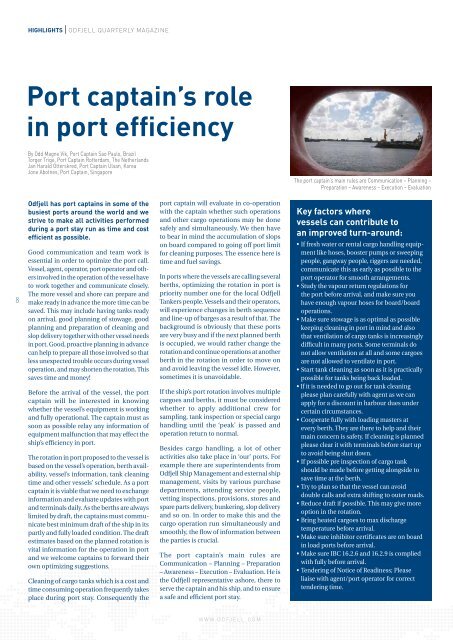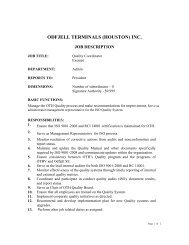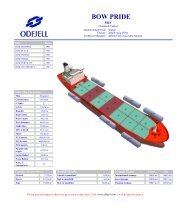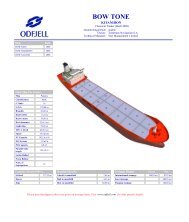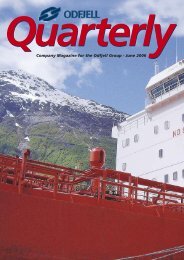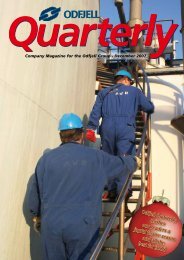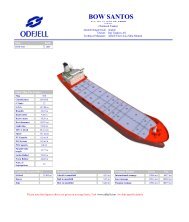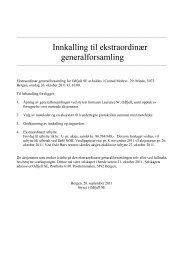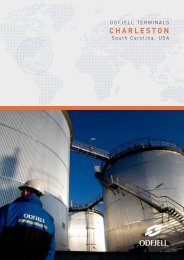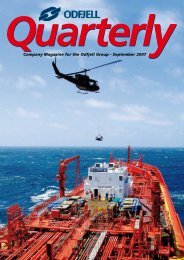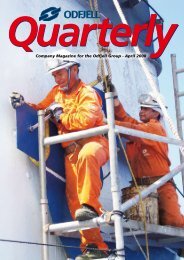Create successful ePaper yourself
Turn your PDF publications into a flip-book with our unique Google optimized e-Paper software.
8<br />
HigHLigHTS odfjell quarterly magazine<br />
Port captain’s role<br />
in port efficiency<br />
By Odd Magne Vik, Port Captain Sao Paulo, Brazil<br />
Torger Trige, Port Captain Rotterdam, The Netherlands<br />
Jan Harald Otterskred, Port Captain Ulsan, Korea<br />
Jone Abotnes, Port Captain, Singapore<br />
<strong>Odfjell</strong> has port captains in some of the<br />
busiest ports around the world and we<br />
strive to make all activities performed<br />
during a port stay run as time and cost<br />
efficient as possible.<br />
Good communication and team work is<br />
essential in order to optimize the port call.<br />
Vessel, agent, operator, port operator and others<br />
involved in the operation of the vessel have<br />
to work together and communicate closely.<br />
The more vessel and shore can prepare and<br />
make ready in advance the more time can be<br />
saved. This may include having tanks ready<br />
on arrival, good planning of stowage, good<br />
planning and preparation of cleaning and<br />
slop delivery together with other vessel needs<br />
in port. Good, proactive planning in advance<br />
can help to prepare all those involved so that<br />
less unexpected trouble occurs during vessel<br />
operation, and may shorten the rotation. This<br />
saves time and money!<br />
Before the arrival of the vessel, the port<br />
captain will be interested in knowing<br />
whether the vessel’s equipment is working<br />
and fully operational. The captain must as<br />
soon as possible relay any information of<br />
equipment malfunction that may effect the<br />
ship’s efficiency in port.<br />
The rotation in port proposed to the vessel is<br />
based on the vessel’s operation, berth availability,<br />
vessel’s information, tank cleaning<br />
time and other vessels’ schedule. As a port<br />
captain it is viable that we need to exchange<br />
information and evaluate updates with port<br />
and terminals daily. As the berths are always<br />
limited by draft, the captains must communicate<br />
best minimum draft of the ship in its<br />
partly and fully loaded condition. The draft<br />
estimates based on the planned rotation is<br />
vital information for the operation in port<br />
and we welcome captains to forward their<br />
own optimizing suggestions.<br />
Cleaning of cargo tanks which is a cost and<br />
time consuming operation frequently takes<br />
place during port stay. Consequently the<br />
port captain will evaluate in co-operation<br />
with the captain whether such operations<br />
and other cargo operations may be done<br />
safely and simultaneously. We then have<br />
to bear in mind the accumulation of slops<br />
on board compared to going off port limit<br />
for cleaning purposes. The essence here is<br />
time and fuel savings.<br />
In ports where the vessels are calling several<br />
berths, optimizing the rotation in port is<br />
priority number one for the local <strong>Odfjell</strong><br />
Tankers people. Vessels and their operators,<br />
will experience changes in berth sequence<br />
and line-up of barges as a result of that. The<br />
background is obviously that these ports<br />
are very busy and if the next planned berth<br />
is occupied, we would rather change the<br />
rotation and continue operations at another<br />
berth in the rotation in order to move on<br />
and avoid leaving the vessel idle. However,<br />
sometimes it is unavoidable.<br />
If the ship’s port rotation involves multiple<br />
cargoes and berths, it must be considered<br />
whether to apply additional crew for<br />
sampling, tank inspection or special cargo<br />
handling until the ‘peak’ is passed and<br />
operation return to normal.<br />
Besides cargo handling, a lot of other<br />
activities also take place in ‘our’ ports. For<br />
example there are superintendents from<br />
<strong>Odfjell</strong> Ship Management and external ship<br />
management, visits by various purchase<br />
departments, attending service people,<br />
vetting inspections, provisions, stores and<br />
spare parts delivery, bunkering, slop delivery<br />
and so on. In order to make this and the<br />
cargo operation run simultaneously and<br />
smoothly, the flow of information between<br />
the parties is crucial.<br />
The port captain’s main rules are<br />
Communication – Planning – Preparation<br />
– Awareness – Execution – Evaluation. He is<br />
the <strong>Odfjell</strong> representative ashore, there to<br />
serve the captain and his ship, and to ensure<br />
a safe and efficient port stay.<br />
www.odfjell.com<br />
The port captain’s main rules are Communication – Planning –<br />
Preparation – Awareness – Execution – Evaluation<br />
Key factors where<br />
vessels can contribute to<br />
an improved turn-around:<br />
• If fresh water or rental cargo handling equipment<br />
like hoses, booster pumps or sweeping<br />
people, gangway people, riggers are needed,<br />
communicate this as early as possible to the<br />
port operator for smooth arrangements.<br />
• Study the vapour return regulations for<br />
the port before arrival, and make sure you<br />
have enough vapour hoses for board/board<br />
operations.<br />
• Make sure stowage is as optimal as possible<br />
keeping cleaning in port in mind and also<br />
that ventilation of cargo tanks is increasingly<br />
difficult in many ports. Some terminals do<br />
not allow ventilation at all and some cargoes<br />
are not allowed to ventilate in port.<br />
• Start tank cleaning as soon as it is practically<br />
possible for tanks being back loaded.<br />
• If it is needed to go out for tank cleaning<br />
please plan carefully with agent as we can<br />
apply for a discount in harbour dues under<br />
certain circumstances.<br />
• Cooperate fully with loading masters at<br />
every berth. They are there to help and their<br />
main concern is safety. If cleaning is planned<br />
please clear it with terminals before start up<br />
to avoid being shut down.<br />
• If possible pre inspection of cargo tank<br />
should be made before getting alongside to<br />
save time at the berth.<br />
• Try to plan so that the vessel can avoid<br />
double calls and extra shifting to outer roads.<br />
• Reduce draft if possible. This may give more<br />
option in the rotation.<br />
• Bring heated cargoes to max discharge<br />
temperature before arrival.<br />
• Make sure inhibitor certificates are on board<br />
in load ports before arrival.<br />
• Make sure IBC 16.2.6 and 16.2.9 is complied<br />
with fully before arrival.<br />
• Tendering of Notice of Readiness; Please<br />
liaise with agent/port operator for correct<br />
tendering time.


